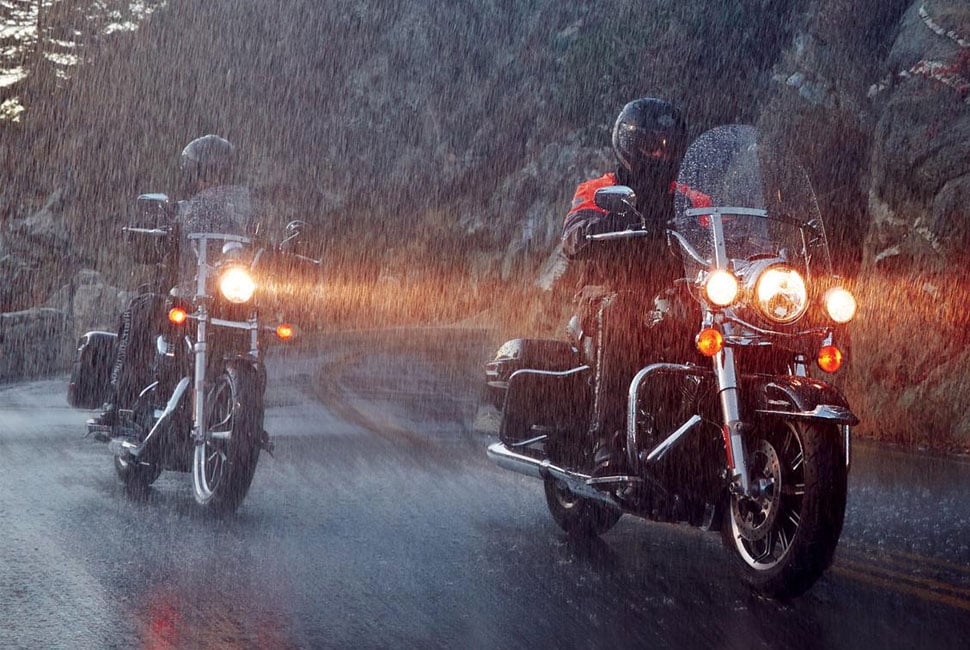By: Joseph Cescon and Nicole Fielding, Summer Student
Part of the thrill of riding a motorcycle is being immersed in the elements. However, the impact bad weather can have on a motorcyclist is significant, even for the most experienced riders. Whether you use your motorcycle regularly or not, it is essential to always be prepared for the unexpected when you hit the road.
Gear Up
Dressing for the weather is a simple way to ensure a comfortable ride in all conditions. What may seem like a light drizzle off the road can feel like small stones against your skin when you are riding a motorcycle. A full-face helmet not only protects your skull but also keeps rain or snow out of your eyes. Adding a rain repellant product to your face shield can also help keep drops from accumulating.
Gloves and heavy clothing made of a material that protects your skin in the event that you encounter poor weather or hit pavement, are crucial for a safe ride. As well, look for durable shoes with a rugged sole and a closed toe to prevent your feet slipping and guard against the elements.
Check out our article about gearing up for your ride for more tips on what to wear.
Consider Your Bike
There are some aspects of pre-ride bike maintenance that become more important when dealing with bad weather. You should always confirm that your bike is in good operating condition, with extra attention being paid to your brakes and your tires. Ensure the tread on your tires is in good form, as these will be your first point of contact with the road, which could be slippery.
You will also want to confirm your visibility to other drivers and road users. Before a ride, check that all your lights, including the tail and brake lights, are in working condition. Riding with your main beams on in low visibility conditions will not only help you navigate the roadway, but it will also alert other drivers to your presence on the road.
For more information about maintaining your bike, read our post about basic maintenance, and what to check before you ride.
Plan Your Trip
Taking some measures to pre-plan a trip can pay off significantly if you encounter bad weather on the road. While trekking off the beaten path can be exciting, knowing your route beforehand can save you stress later on should you encounter rough roads. It will also allow you to better focus on your driving and the road conditions, crucial when travelling in rough weather.
Be aware of existing hazards that may be exacerbated in the event of bad weather, and look up possible rest stops that you can use should conditions become too poor to continue riding. Avoid stopping on the shoulder or the side of the road unless absolutely necessary, as this put you in close proximal risk of other road users.
The Ministry of Transportation has a comprehensive website with traffic cameras and updated reports on Ontario roads, which can assist you in gauging road conditions for your route. As well, navigation apps like Waze provide real-time road information from other road users, which can help you switch up your route, and divert around trouble areas.
Expect the Unexpected
Even when the weather is beautiful, it is important to always remain aware and alert to changing conditions when out on the roads.
When riding in rain, it is important to take extra precautions. Often, wet weather conditions can reduce the grip of your tires on the road. Be gentle with braking, and avoid accelerating on turns or making sudden movements. When encountering an icy patch, avoid the use of your brakes entirely and travel slowly.
Wind can also affect your ride. Side winds in particular can turn your motorcycle into a sail. Be prepared to lean into crosswinds in order to remain upright.
It is important to remember that over time, roads collect oil and dirt, and this is released when it rains, making for slipperier than normal conditions. As a result, road conditions will often be worse at the start of showers, so if rain occurs, you may be best to wait until half an hour into the rain to take your motorcycle onto the roads.
Taking into account experience, preparation, knowledge, and risk tolerance, riding in rain or bad weather should ultimately be avoided. Riding in bad weather can increase your risk of serious personal injury should you become involved in an accident, and this risk increases with poor visibility, wet roads, or high winds.
This said, there are times when riding cannot be avoided, or unexpected weather starts after you hit the road. In these scenarios, some small adjustments and prior considerations can ensure you are more prepared to handle whatever weather you encounter.
If you or a loved one is injured in a motorcycle accident, contact one of the critical injury lawyers at McLeish Orlando LLP for a free consultation.






